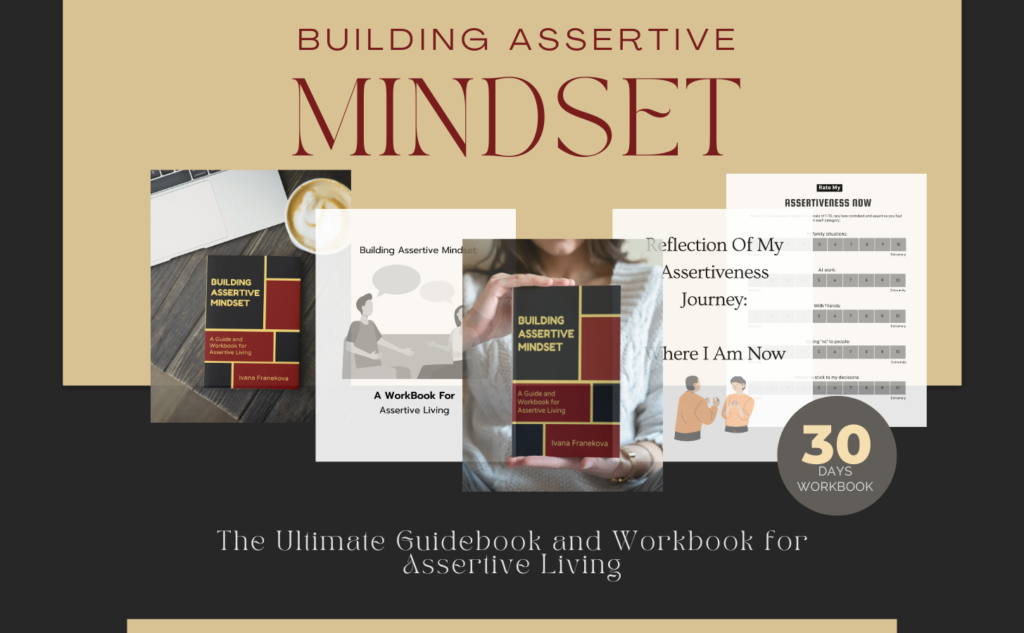In today’s fast-paced world, mastering assertiveness skills has become an essential tool for personal and professional growth.
It’s not just about being confident; it’s about communicating your needs and respecting others in a balanced and healthy way.
I’ve recently launched a new book, ‘Building Assertive Mindset: A Guide to Assertive Living’, which provides a deep dive into the realm of assertiveness. But before we delve into that, let’s explore nine simple steps you can take to improve your assertiveness skills.
Identify Your Assertiveness Challenges.
The journey towards assertiveness starts with self-awareness. Reflect on situations where you feel your response was too passive or aggressive. Make a list of these instances, ranking them from the easiest to the most challenging. This list is your personal assertiveness roadmap.
2. Spot Unhelpful Thinking.
Often, our thought patterns dictate our actions. Negative beliefs about assertiveness can be roadblocks to developing the skill. My video workshop, 6 ways on how to say no, might provide insights into any unhelpful beliefs you may harbor about assertiveness:
3. Foster Assertive Thinking.
Once you’ve identified negative thought patterns, it’s time to cultivate a more assertive mindset. This doesn’t mean you must be forceful, but it does involve standing up for yourself while respecting others’ rights and feelings.
4. Recognize Unhelpful Behaviors.
Our behaviors reflect our thoughts. What behaviors have you exhibited in past situations that were less than helpful? Remember, both verbal and non-verbal cues play a role in how others perceive us.
5. Develop Assertive Behaviors.
Replace your unhelpful behaviors with more assertive ones. This might mean expressing your thoughts more clearly, maintaining better eye contact, or even simply learning to say ‘no’ without feeling guilty.
6. Rehearse Assertive Interactions
Practice makes perfect. It can be beneficial to rehearse what you want to say or how you want to react in certain situations. This way, when the situation arises, you’ll be ready.
7. Take the Leap.
The next step is to bring your planning into action. Engage in the tasks you’ve identified, armed with your new assertive thinking and behaviors. Remember, it’s okay to make mistakes – they’re learning opportunities.
8. Reflect and Reward Yourself.
After each task, reflect on what went well and areas where you can improve. Reward yourself for the effort, because every step forward is a success in itself.
9. Keep Practicing.
As with any skill, consistency is key to mastering assertiveness. Keep practicing until you feel comfortable and confident in assertive situations. It’s a journey, and each step brings you closer to the goal.
Remember, the path to assertiveness isn’t always easy, but it’s definitely worth it.
And if you’re looking for more in-depth guidance, check out my new book ‘Building Assertive Mindset: A Guide to Assertive Living’, where I delve deeper into each of these steps and provide additional tips and techniques to hone your assertiveness skills.
If you prefer digital version of my book, visit https://anxietycurse.com/building-assertive-mindset/.
Assertiveness is not about winning or losing; it’s about expressing your thoughts and feelings clearly and respectfully. It’s about creating a balance in your life. Are you ready to embark on your assertiveness journey?
Further articles you may like:
1606, 2023
708, 2022
1707, 2022
Anxiety And Procrastination At Work
Can Anxiety cause Procrastination? Absolutely. Anxiety and Low Mood can both result in Procrastination at work. In this article, I'm going to take a closer look at what Procrastination is, and how to help yourself if you struggle with Anxiety AND procrastination. Let's start with Procrastination: First of all, people mistake procrastination
2606, 2022
405, 2022
Assertiveness Mastery: 9 Effective Steps to Improve Assertiveness Skills and Boost Self-Confidence
In today's fast-paced world, mastering assertiveness skills has become an essential tool for personal and professional growth. It's not just about being confident; it's about communicating your needs and respecting others in a balanced and healthy way. I've recently launched a new book, 'Building Assertive Mindset: A Guide to
1204, 2022





